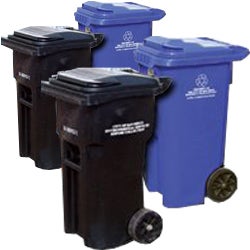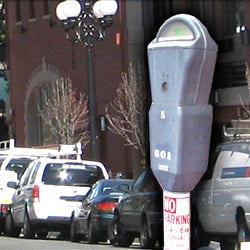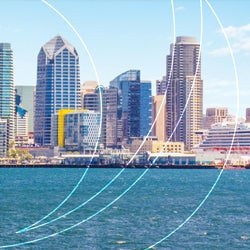Commercial Food Waste Recycling Participants
Current Participants
The Marine Corps Recruit Depot (MCRD) was the first participant in the City of San Diego's Miramar Greenery Food Waste Composting Program. The program started as a pilot in 2001, and became a regular program in 2002. MCRD is the training ground for new marines, and its population varies according to number of recruits in training. On average, it serves 12,000 meals a day, composting approximately 17 tons of pre-and post-consumer food waste per week. Their food waste composting program represents 38% of their waste diversion and shows the San Diego military forces' commitment to the region's environment.
In 2005, Point Loma Nazarene University (PLNU) was the first university campus to participate on the City of San Diego's Miramar Greenery Food Waste Composting Program. The campus serves an average of 3,900 meals per day, donates all edible food to local charities, and generates approximately two tons per week of pre- and post-consumer food scraps that are composted at the City of San Diego's Miramar Greenery. The University also has on-site composting and vermicomposting for students, and applies the compost in their community garden. Since the beginning of the program, the University created a video to educate students about food waste, eliminated trays from its cafeteria to decrease the amount of food students could carry from the buffet, which decreased the amount food students wasted during their meals. The Food Waste Composting Program saves the campus over $3,000 in disposal costs annually.
Sea World San Diego has been participating in the City of San Diego's Food Waste Composting Program since 2006. The park serves thousands of meals a day, generating an annual average of five tons of pre-consumer food scraps per week, that are composted at the City of San Diego's Miramar Greenery. Each restaurant kitchen collects their food waste, and when the park closes at the end of the day, the material is taken to a central food waste compactor. The program currently represents nearly six percent of the park's waste diversion, and realizes tens of thousands of dollars in annual savings on waste hauling and disposal costs.
San Diego State University (SDSU) started their food waste composting program in 2006. Since then, the University has been composting an average of three tons of food scrap a week at the City of San Diego's Miramar Greenery composting facility. The food scrap is generated from pre-consumer preparation of approximately 15,000 meals per day. The program has been implemented in all five kitchens, and as a result has saved the University over $3,000 a year on waste hauling and disposal fees. The campus has numerous students involved in environmental groups that are working together with university staff to expand the program to include post-consumer food waste at all of their food courts and cafeterias.
The San Diego Convention Center (SDCC) has been participating in the City's Food Waste Composting Program since 2007. Their food waste generation depends on the types of events they are hosting. In general, they serve an average of 5,000 meals per day, donate all the edible food to local charities, and compost approximately three tons of food scraps per week at the City's Miramar Greenery. The food waste composting program represents 19% of the SDCC's waste diversion and over $3,000 annual savings on on hauling and disposal costs.
Petco Park, home of the San Diego Padres, is the first sports stadium to participate in the City of San Diego's Food Waste Composting Program. The stadium started the program in 2005. Hosting 81 games, and an average of 120 events a year, composting over 100 tons of food waste per year. They expanded the program in 2007, more than doubling their annual food waste diversion with an average of 1.7 tons of pre-and post-consumer food waste per game during the baseball season. PETCO Park donates eatable food to local charities and diverts 12% of their waste with the food waste composting program. The program is saving the stadium over $16,000 per year on waste hauling and disposal services. The ballpark also composts their grass clippings. The implementation of a comprehensive recycling program and the food scraps composting program has driven the Ballpark to an 84% waste diversion rate. In 2010, PETCO Park was awarded by the California Environmental Protection Agency and the Natural Resources Agency, with the Governor's Environmental and Economic Leadership Award Program (GEELA) for their environmental initiatives in 2010.
The San Diego International Airport has been participating in the City of San Diego's Food Waste Composting Program since 2009. The airport has some of the busiest coffee shops in the county and coffee grinds make up over 80% of the food waste collected, so the Airport started their composting efforts here. In 2010, the Airport expanded its program to include a variety of fruits, fruit rinds, vegetables and whole grains. Even while much of the Airport's food is prepared elsewhere, the airport still generates between one and one-half tons of food scraps per week. Currently, the food waste composting program represents approximately 10% of their waste diversion in addition to saving them over $4,000 per year on waste hauling and disposal services.
The Hilton San Diego Bayfront Hotel was the first hotel in San Diego to start a food waste composting program with the Miramar Greenery. The thirty-story high-rise with over 1,190 guest rooms and suites, has four pre-consumer food waste collection sites, including two main kitchens, two bars, and a coffee shop. They also collect post-consumer food waste from within the employee cafeteria and banquet operations. The Hotel serves an average 1,500 meals per day, and donates all edible food to local charities. During their first eight months, their food waste composting program diverted an extra 11% of their waste stream, composting over 124 tons of food waste, and saving the hotel approximately $8,000 in landfill tipping fees and waste hauling costs.
The Sheraton San Diego Hotel and Marina was the second hotel in San Diego to start a food waste composting program with the Miramar Greenery. The two high-rise towers hotel with 1,053 guest rooms and suites, has two main kitchens servicing four restaurants and one full bar, and serves between 2,000 to 2,500 meals per day. The hotel also collects post-consumer food waste from within the employee cafeteria and banquet operations. In the first five months of the program, the hotel composted over 100 tons of food scraps from the Marina Tower, and is now expanding it to their second tower adding over 300 guest rooms With the implementation of the food scraps composting program, and adjustments made on their commodities recycling program, the hotel has achieved 83% waste diversion rate, and is saving approximately 40% on its monthly hauling services (trash, recycling and composting).
TheUniversity of California San Diego's Housing/Dining/Hospitality Department joined the City of San Diego's Food Waste Composting Program in August 2010. It first started the program collecting pre-consumer food waste from five of their seven kitchens, generating an average of three and one-half tons of food waste per week. After the first six successfully months, the University expanded the program to all its kitchens - an average of 6,000 meals a day; and started a pre-consumer food waste collection pilot program at two of their restaurants. The University staff's commitment with the program, counted on the important and resourceful support of the student body, which played an vital role on the education outreach for the post-consumer pilot program. Their food waste composting program, currently represents 25% of the campus' waste diversion, with a potential to increase once the post-consumer collection is fully implemented
Feeding America is the first food bank in the City of San Diego to participate in the food waste composting program. As a food bank, this organization closed the loop with their efforts to feed people by turning their food waste into composting at the Miramar Greenery. The food that can't be donated to people, are turned into composting, which in turn will enrich local farmers' and residents' soil to grow healthy crops for new food supplies. Since joining the program in 2011, Feeding America San Diego has being composting an average of four tons of food waste per week, significantly contributing to their mission of feeding the hungry and saving over $7,000 per year in landfill tipping fees.
The Forbes 500 Five Stars The Grand Del Mar Hotel has been participating in the City of San Diego's food scraps composting program since October 2011. The 249 guest-rooms resort also includes a golf-course, a club house, three restaurants, two bars and one coffee shop, serving an average of 1,000 meals per day. The hotel collects pre- and post-consumer food waste generating an average of two tons of food scraps per week collected in thirty-two and sixty-five gallon toters, thorough a three times per week route collection service. With the implementation of the food scraps composting program, and adjustments made on their commodities recycling program, the hotel has achieved over 75% waste diversion rate, from which 35% is food scraps, decreasing trash services from 39 cubic yards per week to 4 cubic yards per week, and realizing a hauling/tipping fee cost savings of 22%.
Albertsons is the first grocery store chain participating in City of San Diego food scraps composting program. Fifteen stores in the region have been participating on a route collection system since August 2011, generating each an average of 468 lbs of food scraps per day. Albertsons is an active participating in the Food Rescue program, donating edible food to the local Feeding America food bank. As a result of its combination of a comprehensive recycling, reuse, donation and food composting programs, each store has cut over 110 cubic yards of trash that would be sent to the landfill; donating 58 tons of food and composting over 37 tons of food scraps per year.
Bombay Exotic Cuisine of India is the first independent restaurant in San Diego to start a food scraps composting program with the Miramar Greenery in November 2011. The restaurant composts pre- and post-consumer food scraps from an average of 100 meals per day. Bombay joined one of the food scraps composting routes in the City of San Diego using thirty-five and sixty-five gallon toters that are serviced three times per week, diverting an average of half a ton of food waste per week. Since implementing the program, the restaurant has decreased its trash services from six cubic yard dumpster serviced seven days a week to three cubic yard dumpster serviced three times a week, saving approximately $500 a month in landfill tipping fees and waste hauling costs.
Snooze, an A.M. Eatery is one of the independent restaurants in San Diego participating in the food scraps composting program with the Miramar Greenery. Snooze Hillcrest joined the program in November 2011. In 2013 they opened a new site off Del Mar Heights Rd that also joined the program participating on a route using thirty-two and sixty-five gallon carts that are serviced three times per week. Each site diverts an average of one ton of pre- and post-consumer food scraps from an average of 500 meals per day. Since implementing the program, the Hillcrest restaurant has decreased its three cubic yard trash dumpster services from four to two times per week, saving approximately 50% in landfill tipping fees and waste hauling costs. The Del Mar Heights restaurant implemented their waste services based on the experience of the Hillcrest site.
The Crowne Plaza Hanalei San Diego Hotel is one of the hotels in San Diego participating in the City's food scraps composting program with the Miramar Greenery. The 417 guest rooms and suites, is collecting pre and post consumer food waste cleaned by their kitchen staff. The Hotel serves an average 905 meals per day, and donates all eatable foods to local charities. During their first four months, their food waste composting program composted over 9 tons of food waste, collected in two one-cubic yard dumpsters serviced three times per week. The program has allowed the hotel to divert an extra 15% of their waste stream, and saving approximately $200 per month in tipping fees and waste hauling costs.
On November 2011, Nordstrom became the first retail store to participate in the City of San Diego food scraps composting program, composting an average of 200 lbs of food scraps per week from their restaurants and espresso bars. Adding the food scraps composting program to its comprehensive recycling and reuse programs in their three San Diego full-line retail locations, Nordstrom resulted in an 8.5% increase on its 70% yearly waste diversion.
NaPizza is the first Little Italy restaurant participating in the City of San Diego food scraps composting program. They joined the Miramar Greenery program in June 2012, collecting food scraps three times a week on two 32-gal toters. Since joining the program, the restaurant has been bringing approximately one ton per week of pre- and post-consumer food waste collected by their kitchen staff from an average 700 meals per day.
Sharp Memorial Hospital and Sharp Mary Birch Hospital for Women & Newborns are the first hospitals in San Diego to participate in the City of San Diego food scraps composting program. With over 500 beds, the two hospitals are served by the same kitchen, composting an average of four tons of pre- and post-consumer food waste per week. The composting at those hospitals represents more than five percent of the hospitals' extensive waste diversion, significantly improving the total waste diversion for both hospitals. Since starting the program in April 2012, the hospitals have been able to decrease their trash services from four times a week to three times a week, and saved approximately $ 3,394 in tipping fees and waste hauling costs on its five first months of the program.
The County of San Diego began participating in the City of San Diego?s Food Waste Composting Program in 2012. The County composts an average of 1.5 tons per month of pre-consumer food waste at the City?s Miramar Greenery Composting Facility. This results in the County diverting over 18 tons of food waste from the landfill per year by composting into rich organic soil for our region. County facilities currently participating in the Food Waste Composting Program are the Polinsky Children?s Center, County Administration Center, and the County Operations Center.
Jimmy's Famous American Tavern is one of the many restaurants in San Diego participating in the City of San Diego Miramar Greenery's food scraps composting program. The restaurant composts pre and post-consumer food scraps from 350 to 700 meals per day, depending on the season. Jimmy's Famous American Tavern is serviced three days a week by one of the food scraps composting routes in the City of San Diego, diverting an average of half a ton of food waste per week. Since implementing the program, the restaurant decreased their trash services on one day a week, saving approximately $110 a month in landfill tipping fees and waste hauling costs.
Francis Parker School is the first school in San Diego to begin a food scraps composting program with the Miramar Greenery. The 1,239 students, JK-12 grade school serves lunch and snacks for students and 200 staff members, and is composting approximately one ton of food scraps every week. Since implementing the program in August 2012, the school has decreased their three cubic yard trash dumpster trash services from five days to three days a week.
The Lodge at Torrey Pines joined the City of San Diego?s commercial food scraps composting program in November 2012. The 170 guest rooms and suites, collects pre-consumer food waste and post consumer from the dishing wash area from their kitchens, from within the employee cafeteria, and banquet operations. The Lodge serves an average of 750 per day meals per day, and diverts over two tons of food waste per week. Since implementing a comprehensive recycling program and a food scraps composting program, the Lodge has decreased its trash services from 35 tons to 10 tons per month, increasing their waste diversion rate from 15% to over 70%, saving approximately 20% on waste hauling in costs.
The San Diego Marriott Marquis and Marina joined the City of San Diego?s food scraps composting program in January 2013. The two high-rise towers hotel with 1,360 guest rooms and suites, has two main kitchens servicing two restaurants and two full bars, and serves between 2,000 to 2,500 meals per day. The hotel also collects post-consumer food waste from room services and banquet operations as well as Starbucks and a Grab and Go outlet. In the four months of the program, the hotel composted over 130 tons of food scraps. With the implementation of the food scraps composting program, adjustments made on their commodities and reuse recycling program, the hotel has gone from 14.7% to over 75% waste diversion rate, decreasing its monthly waste services from 77 tons of trash and 11.35 tons of recyclables to 21.13 tons of trash, 27.5 tons of recyclables per month, saving approximately $ 25,000 on its annual hauling services (trash, recycling and composting).
Busters Biofuels joined the City of San Diego's food scraps composting program in February 2013. The company is an important component of San Diego's restaurants green initiatives, by collecting used cooking oil and converting it into biodiesel that refuels diesel engines. In the first six months of the program, Buster Biofuels composted at the Miramar Greenery, over five tons of food scraps collected with the used cooking oil. With the addition of the food scraps composting program, to their commodities and reuse recycling programs, the company's used cooking oil product has gone from approximately 90% to 99% waste diversion rate, decreasing its monthly waste services from roughly two tons of trash to one ton of trash.
San Diego Gas & Electric, a Sempra Energy Utility (SDG&E), joined the City of San Diego?s Food Waste Composting Program in August 2012. The company?s three main locations in San Diego: SDG&E Headquarters in Kearny Mesa, Sempra Energy Headquarters in downtown San Diego, and the SDG&E Energy Innovation Center in Clairemont Mesa serve approximately 3,000 meals per month and divert an average of approximately 3 tons per month of pre- and post-consumer food waste at the City?s Miramar Greenery composting facility. The implementation of a comprehensive recycling program and the food scraps composting program has improved the company diversion rate and will save the company some money.
The Manchester Grand Hyatt San Diego joined the City of San Diego's food scraps composting program in May 2013. The two high-rise towers hotel with 1,625 guest rooms and suites at the San Diego Bay, has six kitchens servicing six restaurants and three full bars, and serves between 1,000 and 1,300 meals per day. The hotel also collects post-consumer food waste from room services and banquet operations as well as from the onsite Starbucks store. In the first three months of the program, the hotel composted over 52 tons of food scraps. With the implementation of the food scraps composting program, adjustments made on their commodities and reuse recycling program, the hotel has gone from 18% to 43% waste diversion rate, saving approximately $13,900 on its annual hauling services (trash, recycling and composting).
Qualcomm joined the City of San Diego?s Food Waste Composting Program in July 2103. The program started at the company's Morehouse campus in September, with its main kitchen servicing an average of 32,000 meals per month, and diverting close to 3 tons of food waste each month. In September 2013, the company?s Q&R campus on Lusk Boulevard joined the program, serving approximately 45,000 meals per month, and adding another ton of food waste each month to be composted at the Miramar Greenery. The implementation of the food scraps composting program represented an addition 7% to those campuses? waste diversion rates.
Naval Medical Center San Diego (NMCSD) joined the City of San Diego's Food Waste Composting Program in December 2013. The NMCSD main cafeteria prepares and average of 23,000 meals a month for patients, their companion organizations and staff. Since starting the program, NMCSD has been diverting an average of 11 tons of food waste per month, decreasing trash hauling services from 105 cubic yards to 36 cubic yards per week. The food waste composting program represents approximately 40% of the hospital's total waste diversion, and reinforces the Navy's environmental commitment to San Diego's region waste diversion efforts.
Intuit joined the City of San Diego?s Food Waste Composting Program in October 2014. With an average of 1,100 employees daily on campus, its cafeteria serves between 800 to 1,000 meals a day. Intuit is composting approximately 2.71 tons of pre-and post-consumer food waste per month. The company is serviced once a week by one of the City?s food waste composting routes. The implementation of the food waste composting program represented a 10% increase in the company?s waste diversion rate. Since starting the program the company has been able to decrease its trash services from 12 cubic yards serviced four times a week, to three times a week, saving approximately $2,668.60 in its waste hauling costs per year. Composting with the City is only the beginning. Intuit is currently in the process of removing all one time use materials in an effort to support our zero waste initiative and increase landfill diversion!
Stone Brewing - Liberty Station joined the City of San Diego?s Food Waste Composting Program in September 2014. The brewery at this location has a large restaurant, open air bar, bocce area, and separated meeting rooms for special events, serving an average of 950 meals/day. The restaurant composts pre- and post-consumer food waste, and diverts its hops to feed animals at a local hog farm. Stone Brewing - Liberty Station is serviced two days a week by one of the food waste composting routes in the City of San Diego, diverting an average of 1,500 lbs of food waste per week. Since starting the program and enhancing its recycling efforts, the restaurant went from 20% to 85% waste diversion, changed its waste services from 4 cubic yards of trash serviced 7 times per week and 4 cubic yard of recyclables serviced 7 times per week, to 4 cubic yards of trash serviced twice a week and 10 cubic yards of recycling serviced only 4 times per week, realizing over 40% in trash hauling cost savings. The restaurant is assisting the City?s waste diversion goal, by composting approximately 39 tons of food waste per year.
The Bahia Resort Hotel joined the City of San Diego?s commercial food waste composting program in September 2014. The 313 guest rooms and suites, serves approximately 576 meals/day, and collects pre-consumer food waste and post consumer from the dishing wash area from their kitchens, and also collect post-consumer food waste from within the employee cafeteria and banquet operations. The Bahia diverts over 2.5 tons of food waste per week, allowing the hotel to decrease their trash services from 96 to 28 cubic yards per week. The food waste composting program has assisted the hotel to diverted an extra 22% of their waste stream, saving approximately $300 per month in tipping fees and waste hauling, increasing its waste diversion rate from 55% to 79%.























